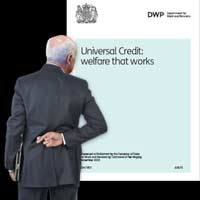Today marks the launch of Universal Credit, the all encompassing change to the welfare system that was furiously scribbled down on the back on an envelope after Iain Duncan Smith watched an episode of Shameless.
The changes, which will prove devastating for many of the lowest income families, are as inept as they are callous and likely to lead to unprecedented chaos. The decision to restrict the roll out of Universal Credit to just a handful of claimants from one Manchester Jobcentre shows how even DWP Ministers are running scared of the new digital by default system.
A gushing press release from the DWP already reveals one major flaw even in this small trial. Addressing concerns that many, if not most, claimants do not have internet access at home, the DWP boast: “Eight computers will be available at Ashton-Under-Lyne Jobcentre Plus to help people who do not have access to the internet, and over 130 computers will also be available at certain libraries and council offices in Tameside.”
Making a claim for Universal Credit will involve providing huge amounts of personal information to the DWP via the internet. Many claimants will have never used a computer before and have little understanding of online security.
It is unlikely Iain Duncan Smith, or Lord Fraud, have ever used an internet cafe or library to access the web. If they did, they might have noticed that it is not uncommon to visit a site such as facebook or yahoo and find the person who used the computer before you is still logged in.
This is one of the reasons that banks warn: “As you cannot be certain about the security of public wireless networks or computers in public places (like a library or internet café) you should be cautious about using internet banking services in these situations. Never change your security details while using a public wireless network or a public computer.”
Far from just changing your security details, such as your password, the DWP seem to be actively encouraging people to make their entire initial claim from public computers. In some cases this could mean the next person to sit down at that machine could have complete access to a previous user’s Universal Credit account. Even if the library or internet cafe uses software to clear caches and remove passwords after each session (and not all do), anyone looking over someone’s shoulder will be able to steal their log in details and gain access to their account.
This is not the first time Iain Duncan Smith has played fast and loose with claimant’s online safety. The government job search website Universal Jobmatch has already been plagued by spam, scams and spoof vacancies. This hasn’t stopped IDS throwing caution to the wind and not just recommending people use libraries to access Universal Credit, but leaving many claimants no other choice.
For all the DWP’s talk about getting tough on benefit fraud, they don’t appear to have a clue about protection from online fraud. Whilst there is no secure way for people to access their Universal Credit accounts then Iain Duncan Smith has created an identity fraudster’s free for all that could turn into a living nightmare for some of the most marginalised people in the UK.
Follow me on twitter @johnnyvoid





 Britain’s welfare state is under such a sustained attack from so many directions, it is difficult to know where to begin a defence.
Britain’s welfare state is under such a sustained attack from so many directions, it is difficult to know where to begin a defence. 
